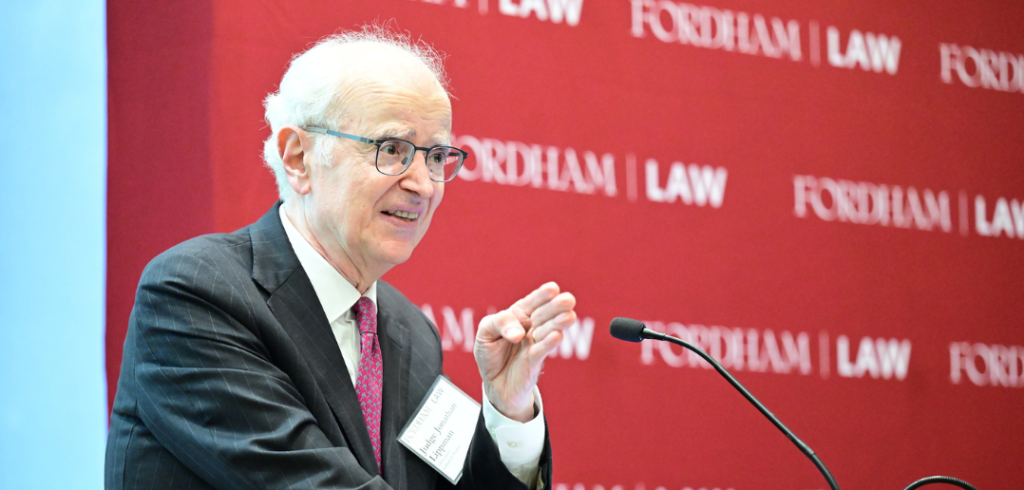New York City has committed to closing the infamous Rikers Island jail by 2027, but to do so the City will need to cut the jail’s population nearly in half. Speaking at a Fordham Law event, Jonathan Lippman, who chaired the 2017 Rikers Commission that examined conditions at Rikers, said that addressing the mental health crisis at the jail differently might be the “secret potion” to doing so.
More than half of all people held in Rikers Island have been diagnosed with a mental illness, making the jail the largest provider of psychiatric services in New York City, and one of the largest in the world. According to Lippman, 27 people have died at Rikers since the beginning of 2022, at least seven of which are suspected suicides.
A panel held on September 13 at Fordham Law examined the mental health crisis at Rikers Island and provided diverse perspectives from both the public defender and prosecution side of this issue. The event was co-sponsored by the Access to Justice Initiative at Fordham Law, the National Center for Access to Justice, the Center on Race, Law and Justice, and the Feerick Center for Social Justice.
Rikers Island has long been the subject of scrutiny for its poor conditions. A key component to further reducing the incarcerated population and eventually closing Rikers, argued some panelists, will be addressing how mental health issues impact incarceration.

In his opening remarks Judge Lippman underscored the importance of closing Rikers Island in 2027, explaining that the Rikers Commission “recommended without any equivocation whatsoever that we close that miserable, horrible place known as Rikers Island—this affront to humanity. Close it once and for all.” Lippman added, “Rikers remains a stain on the soul of our city each and every day.”
“Jail must be the last resort for people with mental illness, as it should be for anyone entering the criminal justice system. If you don’t have to send people to these terrible places, we shouldn’t be doing it,” said Lippman.
Experts Say a New Focus on Mental Health Care is Needed
After Judge Lippman’s opening remarks, NCAJ’s Legal and Policy Director Lauren Jones guided the conversation among the leaders and experts on the panel: Manhattan District Attorney Alvin Bragg, Presiding Judge of the Brooklyn Mental Health Court and Chair of the New York State Judicial Task Force on Mental Health Matthew D’Emic; Deputy Executive Director of The Bronx Defenders Wesley Caines; and Chief Strategic Growth Officer of Fountain House Dr. Ayesha Delany-Brumsey.
Delany-Brumsey discussed how New York City’s jail system got to where it is today and the changes needed moving forward. She pointed to “the joint legacies of mass incarceration and our failure to invest in a true mental health system of care,” as two elements that have led to the crisis at Rikers and other jails in New York City.
Though some progress has been made to reduce the overall jail population—from a high of 20,000 to 6,000 today—there is still more to be done, said Delany-Brumsey.
“We need to start thinking more specifically about the ways that we can reduce contact with the system and also connect [people]with mental health care that will reduce the likelihood that they come back in,” said Delany-Brumsey.
“That includes thinking more broadly about what mental health care means. It means focusing a lot on how we fold housing into that, how we ensure that we’re incorporating substance use into that, and how we also ensure that the mental health care we provide is shaped by people with serious mental illnesses themselves and speaks not just to their symptoms, but to them as whole people.”
District Attorney Bragg also addressed the question of public safety and reducing incarceration, noting that diversion courts—which have kept people out of jails and put them into treatment programs instead—have increased jail diversions considerably. During the same time period, crime rates have dropped in Manhattan, showing that less incarceration doesn’t mean less public safety.
“You can do both,” said Bragg. “We can do a whole lot of diversion, we can do treatment centers, and drive down crime. That’s the recent history of the city.”
Thank you to the @aabany and NAPIPA for convening prosecutors and other members of the legal profession at your annual conference. We were pleased to join this insightful conversation @FordhamLawNYC. pic.twitter.com/5TpJ6Fve9t
— Alvin Bragg (@ManhattanDA) September 23, 2023

